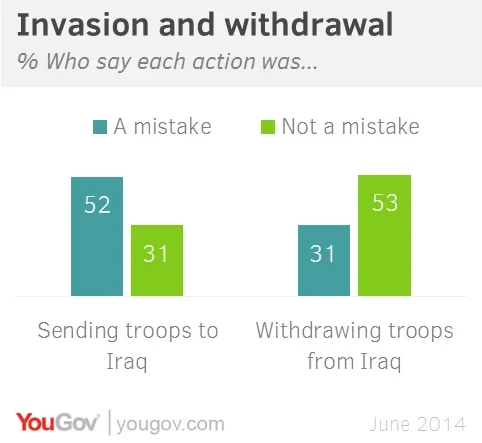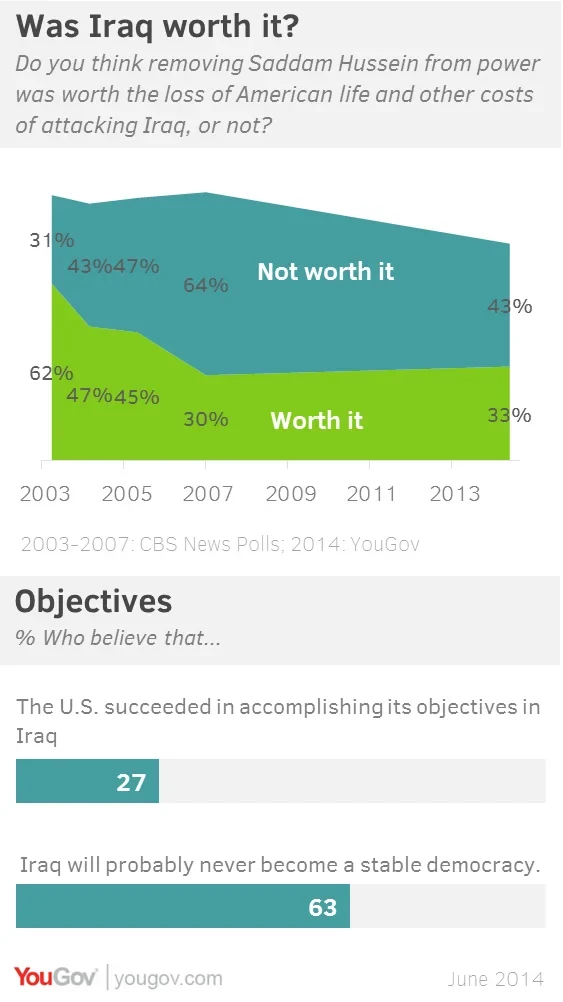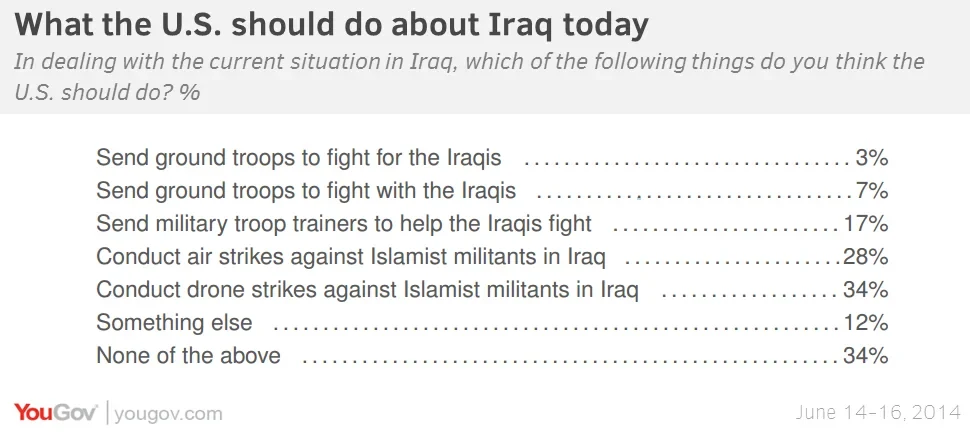Regardless of recent events most Americans don't think it was a mistake to withdraw from Iraq in 2011 and most still think it was a mistake to go in the first place
The capture of multiple cities in Iraq by Islamist militants from a group called the Islamic State in Iraq and Syria (ISIS) and the possibility of sectarian warfare between Sunni and Shiite branches of Islam doesn’t seem to have changed Americans minds about the U.S. invasion of Iraq and the later troop withdrawal. Majorities of the public in the latest Economist/YouGov Poll say the original U.S. involvement was a mistake, and the withdrawal of U.S. troops at the end of 2011 was not.

Opinion mirrors party lines: 69% of Democrats say invading Iraq was a mistake, while 56% of Republicans say it was not. 52% of Republicans think leaving was a mistake, while 76% of Democrats say it was not. Most Americans appear consistent with those who support the war mostly think it was a mistake to leave, while those who say going in was a mistake believe coming out was not one.
But there is some overlap: one in ten Americans think both going into Iraq and withdrawing from Iraq were mistakes. About of third of those who think going into Iraq was not a mistake also say withdrawing troop was the right thing to do.
Americans supported the 2003 invasion of Iraq when it began (though not as strongly as they supported the invasion of Afghanistan in the wake of the terrorist attacks of September 11, 2001). But as U.S. involvement continued support declined. Two years after the start of the war, a CBS News Poll found the country divided on whether the fighting in Iraq was worth it. In early 2007, after the 2006 midterm elections and debate about Iraq cost the GOP their Congressional majority, President George W. Bush announced there would be a troop surge to deal with the worsening situation in Iraq. At that time twice as many Americans believed the removal of Saddam Hussein from power had not been worth the cost than thought it had. The surge made evaluations somewhat less negative, but today barely a third of Americans say that it was worth the cost.

From the public’s point of view, Iraqi citizens are worse off today than they were when the war began. 30% say they are better off because of the U.S. invasion, while half disagree. Half of Republicans say they are better off.
There are few hopes for democracy in Iraq, however. Nearly two-thirds of the public, Republicans and Democrats alike, say Iraq will never become a stable democracy. Only one in four say the U.S. succeeded in accomplishing its objectives in Iraq.
And while Republicans are more willing than others to think the U.S. accomplished its objective, barely a third of Republicans believe that.
As for what to do now, there is little support for any offered alternative. Hardly any Americans would send troops to fight – and just 17% would send U.S. troops even to train Iraqi forces. Air strikes get more support, but only a third would support drone strikes, somewhat more than the percentage favoring manned air strikes. One in three would take no action. Support for sending troops to Iraq is low regardless of circumstances, but if the Iraqi government requested assistance, a recent YouGov survey shows that half the country would support air strikes (48%) and drone strikes (52%).

Republicans tend to be more supportive of military action in Iraq, but fewer than half of them favor drone strikes, and one in four Republicans would take none of the listed actions.
This does not mean that the public is not concerned about Iraq: most (79%) say it matters at least somewhat to the United States if violent Islamic insurgents take control of parts of Iraq. 41% say it matters a great deal.
Republicans may be more supportive than Democrats of additional military action in Iraq because they are more worried about the implications of an Islamic takeover of central Iraq. 54% of Republicans say that would matter a great deal to the United States. Just 30% of Democrats agree.
Image: Getty
Full results can be found here.
Economist/YouGov poll archives can be found here.








